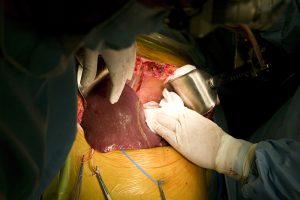Liver Disease Presents Obstacle to Cardiothoracic Surgery

Short of breath, unable to lie down, and experiencing abdominal pain from ascites, a 66-year-old woman from Ohio with chronic myeloid leukemia was diagnosed with advanced heart failure. She would require angioplasty and mitral valve replacement surgery. However, she also had Child class B cirrhosis, making the heart surgeries too risky for the team that had been managing her heart failure to perform.
The patient began researching medical centers. Her cardiologist recommended she consult with specialists at Duke to discuss a potential plan for surgery.
Question: How did Duke approach the patient’s care for both her heart and liver conditions?
Answer: Working in close partnership with the patient, a multidisciplinary team comprising physicians from Duke Gastroenterology, Transplant Hepatology, Cardiology, and Cardiovascular and Thoracic Surgery developed a plan: Before undergoing cardiac surgery, she would be evaluated for liver transplantation to prepare for the possibility of postsurgical decompensation of her liver disease.
When the patient first came to Duke, her liver disease did not meet the criteria for transplantation, explains Matthew Kappus, MD, a Duke gastroenterologist and transplant hepatologist. However, given the risks associated with heart surgery in such a patient, the team wanted to be prepared.
“To prepare, we guided her through evaluation for liver transplantation so as to create a safety net for her after heart surgery in the very possible event of hepatic decompensation,” Kappus says. “She needed to meet our entire team and fully understand the risks and possibilities associated with pursuing surgery in the setting of advanced liver disease.”
The consultations went well, and the patient elected to undergo her heart surgeries at Duke. In the meantime, the liver transplant team discussed her case and stayed in constant communication with the cardiovascular and thoracic surgery team. They recommended that the patient stay in North Carolina following heart surgery to allow for frequent hepatology follow-up.
Not unexpectedly, the patient’s recovery was slow, and, in the 2 months following the surgeries, her liver disease decompensated and she developed worsened ascites. Her synthetic liver function deteriorated, and the team agreed that it would be best to proceed with liver transplantation listing.
Before performing the transplant, Kappus worked with the patient’s medical oncologist in Ohio to establish a medical plan that would allow her to continue to undergo treatment for leukemia in the context of the immunosuppression she would need post-transplant.
The liver transplantation was successful, and the patient’s liver disease and related sequelae quickly resolved. She now has monthly follow-up visits at Duke, and the Duke liver transplant, medical oncology, and cardiology teams continue to coordinate care with the patient’s local specialists in Ohio.
“This case really highlights our commitment to delivering the best possible care for each individual,” Kappus remarks. “We worked with other centers to help her achieve the best possible outcome. Part of that was our close partnership with this patient—she took good care of herself throughout the process—and her family. She’s a fighter.”